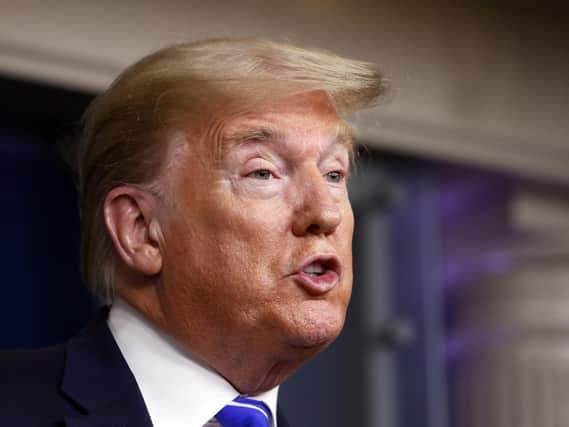The lessons from history as Donald Trump and Joe Biden prepare for US Presidential elections - Fahad Kamal


The cacophony may well cause market volatility, and the impulse to act on the stimuli of screaming heads and scarlet-lettered headlines will be almost irresistible.
Nonetheless, this election too shall pass. It was just four years ago when markets were agitated about the potential implications of a Donald Trump victory. Four years later and fickle investors appear to be dreading the opposite. The common refrain is that Donald Trump – while certainly unconventional – is pro-business, with tax cuts in 2017 being one of his signature presidential achievements.
Advertisement
Hide AdAdvertisement
Hide AdThe logic goes that if Joe Biden should come to power, taxes will rise, which in turn may upend global risk assets, along with increased regulation.
Some of the President’s recent musings even raise the spectre of his refusal to concede a loss or transfer power, should he be dissatisfied with the fairness of the balloting.
We are neither dismissing nor validating the various fears. Some have truth. Corporate taxes, for instance, are likely to increase: from 21 to 28 per cent.
One could argue that this is still well below the tax rate in several major advanced economies (e.g. Australia, France). We could also surmise that large US corporates would already have repatriated waves of foreign-held cash during the last few years of favourable tax treatment.
Advertisement
Hide AdAdvertisement
Hide AdLong-term investors should be more focused on where we expect risk-assets to be on November 4, 2025, rather than November 4, 2020.
Why? Firstly, no-one knows who will win the election, if it will be controversial, or how markets will react. Look no further than four years ago.
Markets were terrified of what would happen if Donald Trump were to win, and few expected such an outlandish thing could occur. History tells us that there is little to choose from between the two main US parties in terms of equity market performance over the long term.
Under Democratic regimes, the average, real annual equity market return is +7.3 per cent. Under Republican administrations, it is +7.4 per cent. In plain words, there is no difference between the two.
Advertisement
Hide AdAdvertisement
Hide AdThe best performing Democrat was Bill Clinton, who presided over annualised US equity market performance of 14.4 per cent: stable inflation and robust economic growth were hallmarks of his tenure.
Woodrow Wilson was the worst performing, even though he is considered one of the most competent US presidents – he created the modern Federal Reserve and broke up monopolies.
Republicans carry similar idiosyncrasies. The best performing Republican was Warren G. Harding, with an annualised performance of over 30 per cent during his presidency. However, his truncated tenure is far more associated with deep corruption.
There is a somewhat wider gap in relative economic growth statistics, where Democrats tend to deliver a more robust performance, which is counter intuitive given Republicans have marketed themselves quite successfully as having a better handle on economic policy.
Advertisement
Hide AdAdvertisement
Hide AdThe reason why returns tend to average out over time, regardless of the party in power, is most likely that the US enjoys rule of law and established institutions that handle the basics of governance.
Some might postulate that this time is different. Indeed, deep, rancorous division across the political spectrum is palpable and can be rather demoralising – but it is not new. Race riots, not new.
The US was arguably far more divided – and racial tensions even more embittered – when Lyndon Baines Johnson pushed through landmark civil rights legislation in the 1960s.
Contested elections – not new.
Four US presidents in the last 150 years have lost the popular vote, but gone on to occupy the White House via the electoral college.
Advertisement
Hide AdAdvertisement
Hide AdBy Fahad Kamal - Chief Investment Officer at Kleinwort Hambros
Support The Yorkshire Post and become a subscriber today. Your subscription will help us to continue to bring quality news to the people of Yorkshire. In return, you'll see fewer ads on site, get free access to our app and receive exclusive members-only offers. Click here to subscribe.
Link to use: https://www.yorkshirepost.co.uk/subscriptions
Comment Guidelines
National World encourages reader discussion on our stories. User feedback, insights and back-and-forth exchanges add a rich layer of context to reporting. Please review our Community Guidelines before commenting.